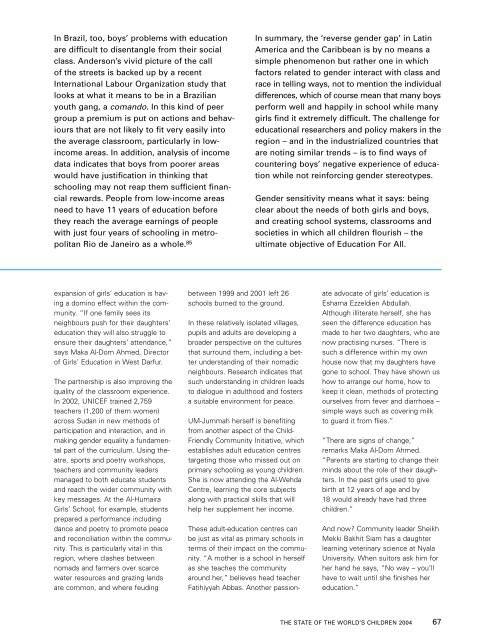THE STATE OF THE WORLD'S CHILDREN 2004 - Unicef
THE STATE OF THE WORLD'S CHILDREN 2004 - Unicef
THE STATE OF THE WORLD'S CHILDREN 2004 - Unicef
Create successful ePaper yourself
Turn your PDF publications into a flip-book with our unique Google optimized e-Paper software.
In Brazil, too, boys’ problems with education<br />
are difficult to disentangle from their social<br />
class. Anderson’s vivid picture of the call<br />
of the streets is backed up by a recent<br />
International Labour Organization study that<br />
looks at what it means to be in a Brazilian<br />
youth gang, a comando. In this kind of peer<br />
group a premium is put on actions and behaviours<br />
that are not likely to fit very easily into<br />
the average classroom, particularly in lowincome<br />
areas. In addition, analysis of income<br />
data indicates that boys from poorer areas<br />
would have justification in thinking that<br />
schooling may not reap them sufficient financial<br />
rewards. People from low-income areas<br />
need to have 11 years of education before<br />
they reach the average earnings of people<br />
with just four years of schooling in metropolitan<br />
Rio de Janeiro as a whole. 85<br />
In summary, the ‘reverse gender gap’ in Latin<br />
America and the Caribbean is by no means a<br />
simple phenomenon but rather one in which<br />
factors related to gender interact with class and<br />
race in telling ways, not to mention the individual<br />
differences, which of course mean that many boys<br />
perform well and happily in school while many<br />
girls find it extremely difficult. The challenge for<br />
educational researchers and policy makers in the<br />
region – and in the industrialized countries that<br />
are noting similar trends – is to find ways of<br />
countering boys’ negative experience of education<br />
while not reinforcing gender stereotypes.<br />
Gender sensitivity means what it says: being<br />
clear about the needs of both girls and boys,<br />
and creating school systems, classrooms and<br />
societies in which all children flourish – the<br />
ultimate objective of Education For All.<br />
expansion of girls’ education is having<br />
a domino effect within the community.<br />
“If one family sees its<br />
neighbours push for their daughters’<br />
education they will also struggle to<br />
ensure their daughters’ attendance,”<br />
says Maka Al-Dom Ahmed, Director<br />
of Girls’ Education in West Darfur.<br />
The partnership is also improving the<br />
quality of the classroom experience.<br />
In 2002, UNICEF trained 2,759<br />
teachers (1,200 of them women)<br />
across Sudan in new methods of<br />
participation and interaction, and in<br />
making gender equality a fundamental<br />
part of the curriculum. Using theatre,<br />
sports and poetry workshops,<br />
teachers and community leaders<br />
managed to both educate students<br />
and reach the wider community with<br />
key messages. At the Al-Humaira<br />
Girls’ School, for example, students<br />
prepared a performance including<br />
dance and poetry to promote peace<br />
and reconciliation within the community.<br />
This is particularly vital in this<br />
region, where clashes between<br />
nomads and farmers over scarce<br />
water resources and grazing lands<br />
are common, and where feuding<br />
between 1999 and 2001 left 26<br />
schools burned to the ground.<br />
In these relatively isolated villages,<br />
pupils and adults are developing a<br />
broader perspective on the cultures<br />
that surround them, including a better<br />
understanding of their nomadic<br />
neighbours. Research indicates that<br />
such understanding in children leads<br />
to dialogue in adulthood and fosters<br />
a suitable environment for peace.<br />
UM-Jummah herself is benefiting<br />
from another aspect of the Child-<br />
Friendly Community Initiative, which<br />
establishes adult education centres<br />
targeting those who missed out on<br />
primary schooling as young children.<br />
She is now attending the Al-Wehda<br />
Centre, learning the core subjects<br />
along with practical skills that will<br />
help her supplement her income.<br />
These adult-education centres can<br />
be just as vital as primary schools in<br />
terms of their impact on the community.<br />
“A mother is a school in herself<br />
as she teaches the community<br />
around her,” believes head teacher<br />
Fatihiyyah Abbas. Another passionate<br />
advocate of girls’ education is<br />
Eshama Ezzeldien Abdullah.<br />
Although illiterate herself, she has<br />
seen the difference education has<br />
made to her two daughters, who are<br />
now practising nurses. “There is<br />
such a difference within my own<br />
house now that my daughters have<br />
gone to school. They have shown us<br />
how to arrange our home, how to<br />
keep it clean, methods of protecting<br />
ourselves from fever and diarrhoea –<br />
simple ways such as covering milk<br />
to guard it from flies.”<br />
“There are signs of change,”<br />
remarks Maka Al-Dom Ahmed.<br />
“Parents are starting to change their<br />
minds about the role of their daughters.<br />
In the past girls used to give<br />
birth at 12 years of age and by<br />
18 would already have had three<br />
children.”<br />
And now? Community leader Sheikh<br />
Mekki Bakhit Siam has a daughter<br />
learning veterinary science at Nyala<br />
University. When suitors ask him for<br />
her hand he says, “No way – you’ll<br />
have to wait until she finishes her<br />
education.”<br />
<strong>THE</strong> <strong>STATE</strong> <strong>OF</strong> <strong>THE</strong> WORLD’S <strong>CHILDREN</strong> <strong>2004</strong><br />
67
















